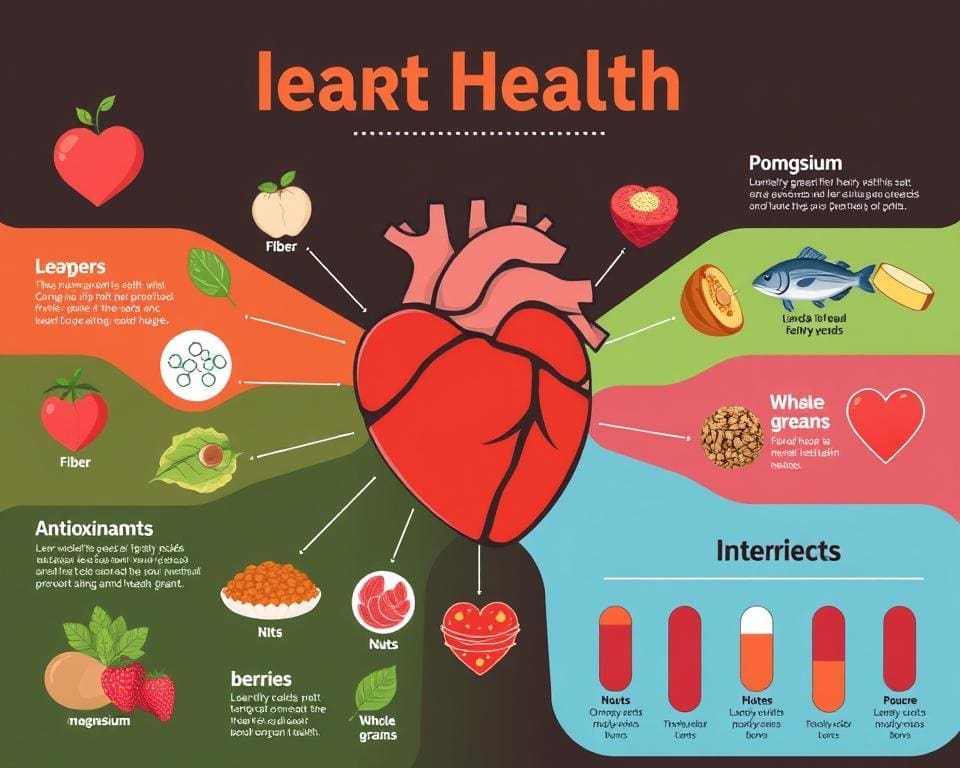Maintaining heart health is essential for overall well-being, and one of the most significant ways to achieve this is through nutrition. Key nutrients play a vital role in supporting optimal heart function and enhancing cardiovascular health. Research highlights that dietary choices greatly influence heart health outcomes, offering a pathway to preventing diseases related to the heart. By incorporating nutrient-rich foods into your daily routine, you can not only fortify your heart but also embrace a healthier lifestyle. Studies from reputable organisations such as the British Heart Foundation and NHS underscore the profound effects of a balanced diet on heart health.
The Importance of Heart Health
Heart health stands as an integral part of overall wellbeing. Maintaining cardiovascular health is essential not only for a longer life but also for enhancing your quality of life. Understanding your heart’s function and the factors influencing its health creates a foundation for a happy and active existence. Awareness of key aspects, including blood pressure, cholesterol levels, and heart rhythm, serves as a guide for making informed decisions.
Understanding Cardiovascular Health
Cardiovascular health encompasses the heart’s ability to pump blood efficiently and the blood vessels’ functionality in distributing this vital fluid. Poor cardiovascular health can lead to serious medical conditions, ranging from heart disease to stroke. It is crucial to monitor your heart health regularly and consider how lifestyle choices impact these vital indicators.
The Role of Lifestyle Choices
Embracing a healthy lifestyle significantly contributes to maintaining heart health. Simple changes can make a profound difference, such as:
- Adopting a balanced diet rich in fruits, vegetables, and whole grains.
- Engaging in regular physical activity, such as walking or cycling, to strengthen the heart.
- Avoiding smoking and limiting alcohol consumption to reduce stress on the heart.
- Managing stress through mindfulness practices like yoga or meditation.

Heart Health: Key Nutrients You Need
Understanding the role of vital nutrients in maintaining cardiovascular health is essential for everyone. A balanced intake of these nutrients supports a heart-healthy diet and fosters longevity. Here, we explore the essential vitamins, nutrient-rich foods, and the benefits of dietary supplements that contribute to optimal heart function.
Essential Vitamins for Heart Function
Essential vitamins play a pivotal role in preserving heart health. Vitamins such as B6, B12, and folate are crucial for managing levels of homocysteine in the bloodstream, a factor linked to heart disease. Incorporating these vitamins into your diet can be achieved through the consumption of:
- Leafy greens like spinach and kale
- Legumes such as lentils and chickpeas
- Fortified cereals that enrich your daily intake
Top Nutrient-Rich Foods for a Healthy Heart
Nutrient-rich foods provide a foundation for a heart-healthy diet. Including a variety of foods ensures a broad spectrum of essential vitamins. Consider adding the following to your meals:
- Fruits, specifically berries and oranges
- Whole grains like brown rice and quinoa
- Nuts and seeds, which are excellent sources of healthy fats
The Benefits of Dietary Supplements
Dietary supplements offer a practical approach to enhance heart health, especially when certain nutrients may be lacking in your diet. Some key benefits include:
- Ensuring adequate intake of essential vitamins
- Providing concentrated forms of nutrients for convenience
- Supporting overall cardiovascular function and health
Creating a Heart-Healthy Diet
Crafting a heart-healthy diet requires a thoughtful approach to your dietary choices. One fundamental strategy is to focus on whole foods rather than processed options. Incorporating an array of vibrant fruits and vegetables not only adds visual appeal to meals but also enriches your diet with essential nutrients and antioxidants that support heart function.
To create a balanced plate, prioritise lean proteins such as chicken, fish, and legumes along with healthy fats derived from sources like avocados, nuts, and olive oil. These choices not only contribute to a heart-healthy diet but also provide sustained energy while keeping you satiated. A blend of macronutrients ensures that your body receives what it needs to thrive.
Lastly, making minor adjustments can lead to significant improvements in your heart health over time. Consider reducing your intake of saturated fats and sugars, which are often abundant in processed foods. By prioritising nutrient-dense options and being mindful of your portion sizes, you lay the groundwork for lasting health benefits and well-being.









